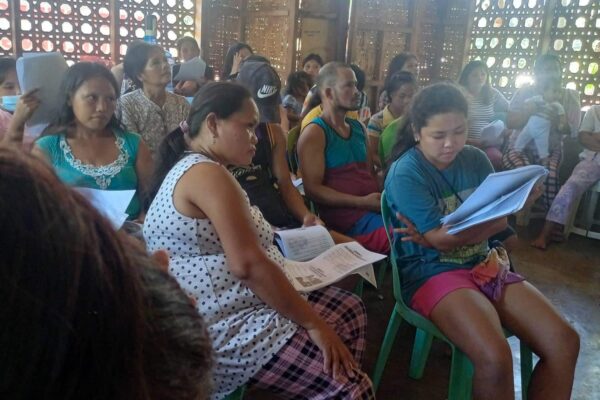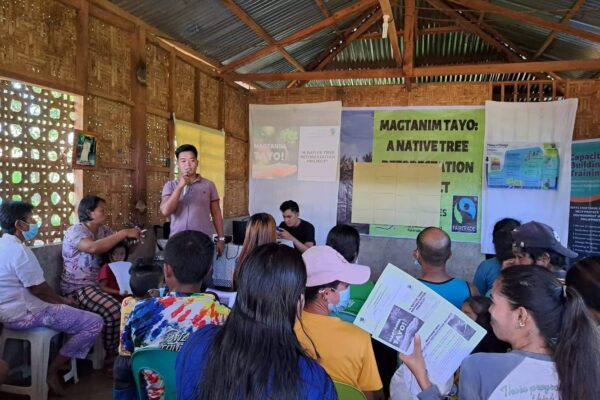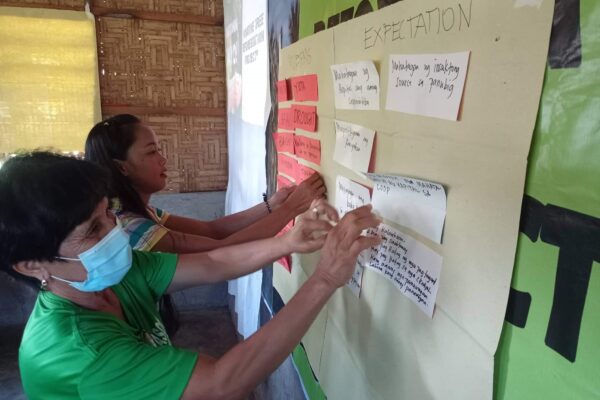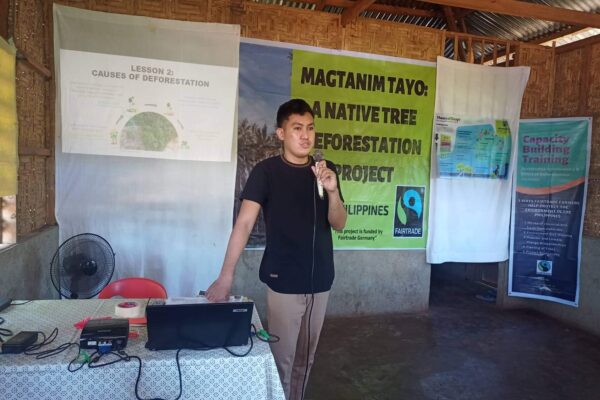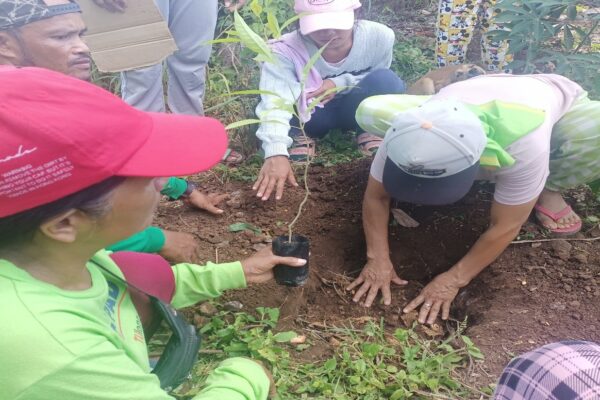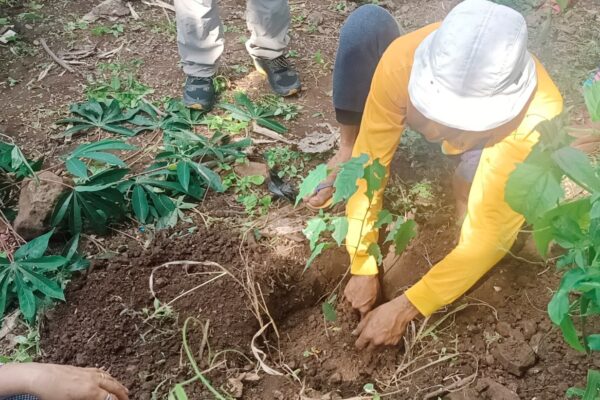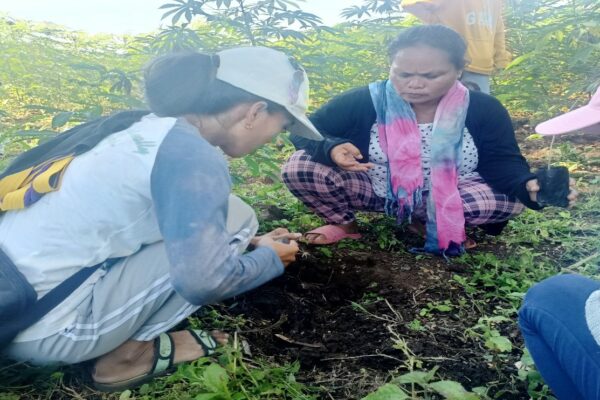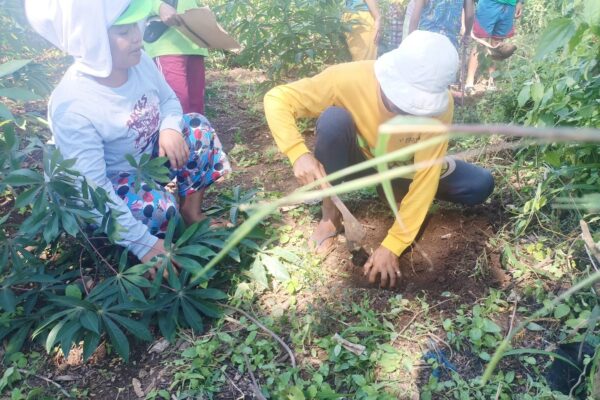In the Philippines, many coconut farms were greatly affected by the decline of the coconut industry several years back. To cope with the loss , many farmers were forced to cut down their coconut trees to produce charcoal and coconut lumber instead of copra. Unfortunately, some Fairtrade coconut farmers’ areas were denuded because of this.
Today, the country faces a number of major problems along with the impact of climate change not only because of its geographical location but directly traceable to deforestation. There is food insecurity due to soil erosion which means depleted nutrients and low crop yield. In many provinces including the Mindanao region where most Fairtrade coconut farmers are located, at least 50% of the topsoil has been lost, and 70% of all croplands are vulnerable to erosion. The country’s climate conditions are such that typhoons sweep the country an average of 20 times a year. The topography is mainly uplands with a slope equal to or greater than 18% and these areas make up 52% of the total land area. In the absence of forest cover and with the frequent heavy typhoons, soil erosion, mass wasting, and landslides are induced.
A Native Tree Reforestation Project is an initiative that targets Fairtrade coconut farming communities in Mindanao Island that promotes the benefits of a sustainable agroforestry system that hosts biodiversity of native species of plants and wildlife. Philippines has 3,600 identified native trees, 67 percent of which are endemic, found only in the country. Unfortunately, many of these native trees are disappearing due to deforestation, replacement by invasive species, and mono-crop plantations. Philippine native trees have also been over-harvested and exported to other countries.
Therefore, with the funding support of Fairtrade Germany, 02 capacity-building workshops were organized by Fairtrade NAPP for Hiniusang Mag-uuma Sa Balingasag Consumers Cooperative and Davnor Fairtrade Coconut Farmers Association in the Philippines with an objective to promote the benefits of a sustainable agroforestry system in coconut farming communities and businesses and to discuss the effects of deforestation and to introduce the principles and benefits of agroforestry system in making agricultural business sustainable.
As a part of the workshop, a Native Tree Reforestation project was implemented by the cooperatives to support areas highly affected by deforestation by planting native trees which will help recover and expand the forest habitats. In the Philippines, foreign or exotic trees are selected for their ability to grow faster and germinate easily but they have a detrimental effect on the ecosystem. They tend to alter the soil around them, preventing other plants to grow and thrive. They are not protective of wildlife, especially of endangered animals that prefer to inhabit and nest on native trees. Therefore, the Native Tree Reforestration project will also help save the threatened species of native plants and animals in the local ecosystem and in addition protect the watershed and freshwater resources and secure the livelihood of local people.
The workshop was provided to 30 participants from the 02 cooperatives who were trained on 04 important modules of deforestation, its causes and effects on the environment and strategies to reduce deforestation, agroforestry system, and its structural, functional, and ecological classification, nurturing and growing native trees, and environment sustainability. 450 native trees were planted by the participants.
The training provides the farmers with an insight into what is currently happening in their environment. They were eager to learn and participate and willing to share their own experiences on the basis of what they observed in their surroundings and how they dealt with it in their daily lives. Such programs help a lot because the farmers can speak and share what their common issues, needs, and challenges are in the area and how they can collectively work on it for a sustainable environment and future for their community. – Trainer
The training was very helpful especially for us as farmers. Prior to the training, neither were we aware of different native trees in our region such as Dao, Kupal, Ipil, Nara, etc. nor we knew how to plant a tree. As a farmer we are skilled in planting crops but not in planting native trees. Land preparation is as important as nurturing the seeds after planting. Through this training we want our children to know about our native species and how these species protect the biodiversity of our farm and improve the quality of air and soil. For us, our wealth comes from our farm produce.
Jake Aquino; Hiniusang Mag-uuma Sa Balingasag Consumers Cooperative


